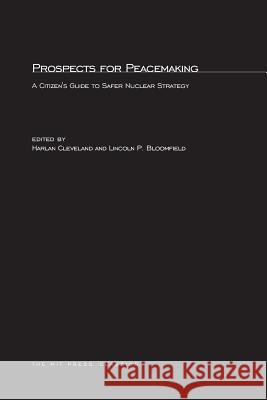Prospects for Peacemaking: A Citizen's Guide to Safer Nuclear Strategy » książka
Prospects for Peacemaking: A Citizen's Guide to Safer Nuclear Strategy
ISBN-13: 9780262532228 / Angielski / Miękka / 2003 / 176 str.
Prospects for Peacemaking provides a genuinely fresh look at embedded assumptions about national security. It clears the way for a security policy based less on outmoded premises and more on a purposeful strategy for peace in a nuclear world. And it demonstrates one model of a creative interaction between citizens and specialists, one that can be replicated in any community."To the village square must go the essential facts about atomic weapons," Albert Einstein wrote in 1946. "From there must come America's voice." The seven essays in Prospects for Peacemaking take up Einstein's challenge - even more urgent today - by demystifying the criti cal issues of war, peace, and national security and opening the way for informed citizen involvement in these issues.The opening chapter explains why we are currently at a good point for engaging in the process of rethinking American strategic policy. Those that follow outline the basic premises of the current relations between the United States and the Soviet Union; the way the military thinks about arms and arms control; the question of whether negotiations can ever keep up with technology; the European perspective on arms control; and the special problem of managing crisis situations. The book concludes with an essay by Dean Rusk on diplomacy in the nuclear era.Prospects for Peacemaking grew out of "the Minnesota experiment," an extraordinary year long process of dialogue between experts in the arms-control community and public citizens, sponsored by the University of Minnesota's Hubert H. Humphrey Institute of Public Affairs. Harlan Cleveland is Professor of Public Affairs and Dean of the Institute. Lincoln P. Bloomfield is Professor of Political Science at MIT, and an adjunct professor at the Humphrey Institute.











